S. BISSELL & SONS LTD. 41 UNION STREET AND HORSELEY
FIELDS, WOLVERHAMPTON
Locks and keys can be found with the name "Bissell" on
them. It is not clear whether they were the actually manufacturers
or designers of these items or whether they were all made for them by
others. No direct claim by them to be manufacturers has been found
but there is a good deal of evidence of their being factors and
wholesalers.
|
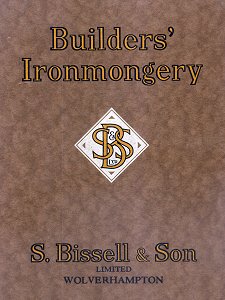 |
A catalogue, of which the cover is shown on the
left, undated but probably from the later 1920s or early 1930s,
shows numerous locks, some of which are marked with their name, some
of which are marked Yale and Etas and many of which are unmarked.
The catalogue also contains more pages of door furniture and
ironmongery than it does pages of locks.
In the Wolverhampton Red Books the company has (so far) first
been traced in the 1930 edition where they are listed under
Builders' Merchants but not under Lock Manufacturers.
Their address is given as 41 Union Street. They have also
been noted in the 1936 edition, also under Builders' Merchants,
with their address being given as 41 Union Street and Horseley
Field (sic). They do not appear in the next edition
inspected, that for 1941-42. |
| This letterhead, dated 1932 (and kindly provided by Trevor
Dowson, lists many types of locks; says that they are
contractors to the Admiralty, War Ofiice and others; lists
many types of lock and many sorts of builders ironmongery; and
also says "established 100 years". |
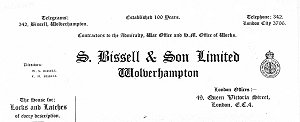 |
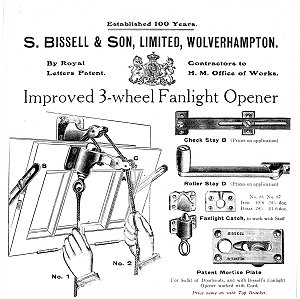 |
This leaflet, also kindly provided by Trevor Dowson, also
dates from 1932.
(Only the top two-thirds are shown here. In the small
print in the omitted part are instructions for operating the
device and prices for openers in polished brass and bronzed
malleable iron.)
This also says they are "established 100 years". But
the trade mark (Shown at the foot of this page) from the same
1932 source, has the words "Established 1838". |
| The following illustrations are taken from the catalogue illustrated
above. They give an indication of the range of goods the firm was dealing
in. |
| A lock from the catalogue, marked Bissell.
It is a common enough type of lock and there is no indication who
might actually have made it. |
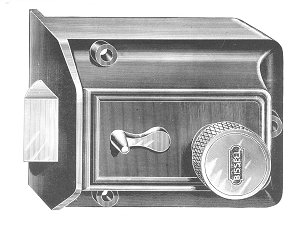 |
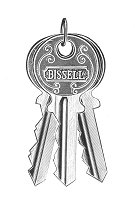 |
There are also keys marked with their name. In
the general range they also offer two designs of "presentation
keys", which are available in silver or gilt, with a presentation
case. Bissells would also engrave them suitably. |
 |
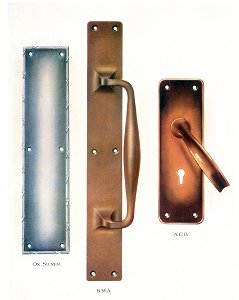 |
The catalogue opens with locks and then goes on to
all sorts of door furniture, including many sorts of finger plates.
Only one page (tipped in) is in colour, the purpose being to shown
the different finishes available.
From left to right they are:
Oxidized Silver, Bronze Metal Antique and Antique Copper Bronzed.
Not illustrated bit said to be also available are Antique Brass,
Satin Brass and Florentine Bronze. It seems that any of their brassfoundry can be supplied in any of these finished.
The Bronze Metal Antique "will not wear off in use but rather
become deeper and more beautiful in the course of time".
The Antique Copper Bronzed "is a coating of copper deposited by
the electro-galvanic process" but "is not so highly recommended
for articles that are in constant use".
The Oxidised
Silver finish can be applied to brass but "there is always the
danger of the silver wearing off and showing the brass";
it is recommended that the finish is used on White Metal. |
Elsewhere in the catalogue there are also glass finger
plates, such as these, which are available plain or
silvered. And there are glass knobs to go with them.
|
|
 |
|
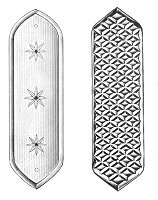 |
The rest of the catalogue is occupied by various sorts of
bolts, sash fasteners, casement stays and fasteners, hinges, door
and floor springs, handles and latches, sash lifts, eyes and
handles, catches, drawer pulls, hat and coat hooks, fanlight openers
and stays, postal knockers and letter plates, sliding door
mechanisms and even "counter grilles in brass or bronze".
Probably all of these things came from different sources.
There were companies in Wolverhampton that made all of them.
But if they all, including the locks, came from one main source,
then James Gibbons would be as good a guess as any.

Bissell's trade mark
|
|